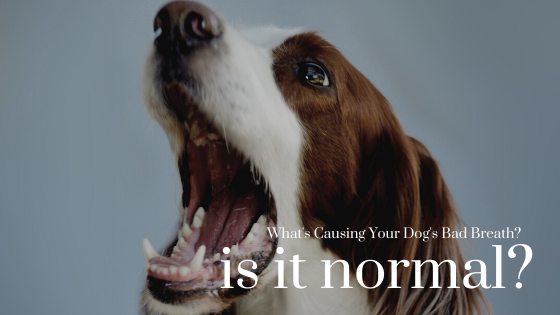What's Causing Your Dog's Bad Breath? Is it Normal?
Dog owners often ignore their pet's bad breath and dismiss it as normal dog breath. It is true that an occasional whiff of bad odor is not necessarily a bad thing. It could just be something the dog ate recently.
However, a bad odor that persists could be an indication of something more serious. Just like humans, dogs can get periodontal disease due to poor dental hygiene. It could also indicate other serious conditions like liver and kidney disease. Before you dismiss the unpleasant odor, you need to carefully consider these possibilities.
Oral Diseases
Periodontal Disease. Periodontal disease could be one of the most likely reasons why your dog has bad breath. It is not uncommon for dogs over the age of 3 to develop this disease. It is caused by the buildup of tartar and plaque which affects the gums causing infections. If left untreated it could lead to complications that could cause persistent pain.
Teething Problems. Dogs below age 3 could have bad breath due to teething problems. As the pup loses its teeth, it is often followed by a buildup of bacteria along the gum-line. This is usually not something to be worried about. After the teething period that lasts for a few months, the bad odor will disappear.
Gum Problems. Some oral complications may be a little more serious than periodontal disease or teething problems. The whiff of unpleasant odors may be due to gum diseases or tumorous growth. This growth allows bacteria to accumulate in the mouth, causing bad breath.
Other Possible Causes
Besides oral diseases, there are other complications that could be behind the bad odor.
Diabetes. Diabetes is another potential factor that could be behind your pet's bad breath. Dogs with diabetes will usually have a fruity smelling breath. You may also notice that the dog is drinking fluids and urinating more frequently. If you notice these symptoms, take him to the vet as soon as possible for diagnosis and treatment.
Kidney Complications. If it's a kidney problem, you will notice a bad odor that has a tinge of urine smell. With kidney complications, its health could deteriorate rapidly. Make a point of booking an appointment with your veterinarian to avoid treating more severe complications in the future.
Liver Disease. Bad breath could also be an indicator of a serious underlying problem such as liver disease. Dogs with liver disease often exhibit symptoms such as vomiting, lack of appetite, and yellowing of eyes. Like kidney disease, this is a serious problem that needs to be diagnosed and treated by a vet without delay.
Gastrointestinal Disease. It is also possible that halitosis is originating from complications in the esophagus, intestines, and stomach.
Treatment and Prevention
Bad breath could be caused by a wide range of factors as mentioned. Sometimes it could also be just something the dog ate from the garbage. But persistent bad odor should not be ignored. You need to establish whether it is an oral health problem or more serious complications. A qualified professional veterinarian should be able to assist.
There are, however, things you can do to prevent bad breath:
Good Oral Hygiene. You need to make a habit of doing those things that help boost your pet's oral health. Just like humans, pets accumulate tartar and plaque and should have their gums and teeth cleaned regularly. You can brush their teeth. With time, dogs learn to enjoy having their teeth cleaned.
Chew Toys. Besides brushing their teeth, you should ensure your pets have chew toys. Chew toys are particularly important for smaller dogs and pups. This is because their teeth are closely packed together, making it easy for plaque and tartar to build up quickly. Thee toys help to clean the gums naturally.
Prevent Access to Bad Diet. Dogs eat a wide range of things besides the food you give them. They can go through the trash and even eat animal carcasses they find around your home. This can not only cause bad breath, but also complications such as gastrointestinal and liver disease due to exposure to toxins. You can prevent this by limiting their access to bad foods from the trash or the outdoors.
To prevent more serious problems causing bad breath, get your dog checked by a vet on a regular basis. Ensure you give your furry friends a well-balanced diet to keep them healthy and halitosis-free.

